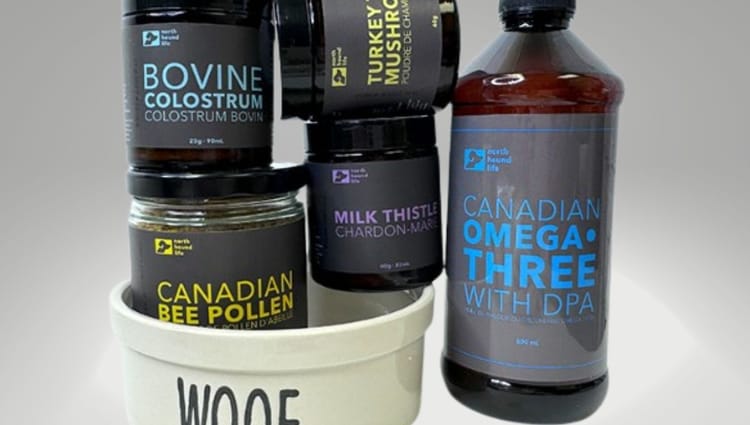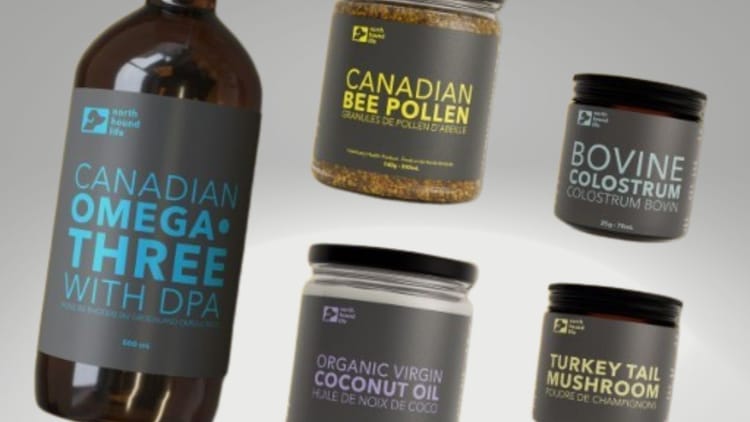Un-BEE-lievable Benefits: Canadian Organic Bee Pollen For Your Furry Friend!

Welcome Canadian Bee Pollen to your furry friend’s diet! This superfood made from bee pollen, plant material, and bee saliva is packed with micronutrients, quercetin, protein, and amino acids that can have a variety of benefits for your pup.
Have an athletic canine companion? Bee Pollen may provide them with the energy they need to stay fit while helping them recover quickly after physical activity.
It contains nearly half of its protein from free-form amino acids, making it ideal for muscle building in your four-legged pal. And, studies suggest that it has quercetin which may provide additional immune system support.
Choose Canadian Bee Pollen the next time you reach for a treat that will give your pup an extra boost of nutrition!
Why We Like It
- Known to help with seasonal allergies.
- Contains quercetin, a natural antihistamine.
- High in bioflavonoids, which strengthen capillaries, protect against free radical damage and has anti-inflammatory effects.
- Helps with dry skin if taken regularly
- Used for energy, especially with sporting dogs
Pros of Bee Pollen For Your Dogs
Allergy Relief
One of the primary benefits of bee pollen for dogs is that it can help to relieve allergies. Bee pollen contains a variety of compounds that can help to reduce inflammation and swelling, both of which are common symptoms of allergies.
Additionally, bee pollen can help to improve the function of the immune system, which can reduce the severity and frequency of allergic reactions.
Skin and Coat Health
Bee pollen can also be beneficial for the skin and coat health of dogs. The compounds in bee pollen can help to improve circulation and promote cell regeneration, both of which can lead to healthier skin and fur.
Additionally, bee pollen contains a variety of vitamins and minerals that can help to keep the skin and coat looking shiny and healthy.
Joint Health
Another benefit of organic bees pollen for dogs is that it can help to improve joint health. Bee pollen contains glucosamine, a compound that is known to be effective in treating joint pain and stiffness. Additionally, bee pollen can help to reduce inflammation, which is a common cause of joint pain.
Digestive Health
Bee pollen can also help promote digestive health in dogs. The compounds in bee pollen can help to increase the growth of beneficial bacteria in the gut, which can lead to better digestion and absorption of nutrients.
Additionally, bee pollen can help to reduce inflammation in the digestive tract, which can alleviate symptoms of conditions such as irritable bowel syndrome.
Cancer Prevention
Some studies have also shown that bee pollen may have cancer-preventative properties. Bee pollen contains a compound called apigenin, which has been shown to inhibit the growth of cancer cells in vitro.
Additionally, bee pollen contains antioxidants that can help to protect cells from damage caused by free radicals.
Canadian Bee Pollen can be a great addition to your beloved pup's diet. Not only does organic bee pollen provide essential minerals and vitamins, it also contains anti-inflammatory, anti-allergenic, antioxidant, and antimicrobial properties.
All these amazing benefits with few side effects or risks make Canadian Organic bee pollen an ideal choice for any caring pet owner who wishes the best for their loved one.
Cons Of Bee Pollen For Your Dog
Allergic Reactions
Some dogs can be allergic to bee pollen granules, just like humans. If your dog is allergic to pollen or other bee products, giving them bee pollen can cause severe allergic reactions, including anaphylaxis.
High Sugar Content
Bee pollen has a high sugar content in the form of glucose and fructose. This may affect blood sugar levels in dogs, which can be particularly dangerous for dogs with diabetes.
Risk of Contamination
Since bee pollen is harvested from flowers, it can contain pesticides, herbicides, and other harmful chemicals that can be toxic to dogs. Therefore, it is important to ensure that you source bee pollen from a reputable organic supplier.
FAQ's
1. How much bee pollen should I give my dog?
The recommended dosage of bee pollen for dogs is approximately 1 teaspoon per day for a 50 lb dog, according to sources such as Animal Wellness Magazine and Bee Pollen Buzz. It is suggested to start with a smaller dose and gradually increase it. However, it's best to consult with a veterinarian before introducing bee pollen into your dog's diet.
2. Can bee pollen help dogs?
Bee pollen can be beneficial for dogs in several ways. According to sources such as Animal Wellness Magazine and Keep the Tail Wagging, bee pollen can help protect and promote a healthy liver, assist in healing for a compromised liver, help to maintain a healthy weight, increase energy and vitality, aid in the prevention of allergies, and more.
However, as with any new addition to a pet's diet, it's important to start slow and monitor your pet's reaction, as some dogs may have an allergic reaction to bee pollen. The recommended starting dose for a 50 lb dog is 1/3 teaspoon per day, gradually increasing to a maximum of 1 teaspoon per day.
3. What are the side effects of bee pollen for dogs?
Bee pollen can trigger allergic reactions in dogs with pollen allergies. Bee pollen has high sugar content in the form of glucose and fructose, which may affect dogs with diabetes or overweight issues.
It is recommended to start with a small dose of 1/3rd of a teaspoon per day and gradually increase to ensure that the dog does not have any sensitivity. Additionally, bee venom can cause mild natural side effects similar to a normal bee sting, such as swelling, itching, redness, and general fatigue.
4. How do you use organic bee pollen?
You can use it as a topper on your dogs normal meals. Follow the directions on the suppliers' labels.
In conclusion, while there are potential benefits to giving your dog bee pollen, it is essential to consider the risks and consult with your veterinarian before adding it to your dog's diet. If your dog has any underlying health conditions or allergies, bee pollen may not be appropriate for them. Begin with a small dose and gradually increase the dosage of the organic bee pollen for dogs.
With its collection of nutrients and natural protective components, it might just be the perfect fit for your four-legged family member’s health.
Let's make sure our furry friends get the best care that they deserve!






